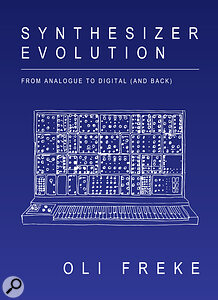Synth fans of a certain age will remember the Keyfax books by musician and sometime SOS contributor Julian Colbeck. Back in the late ‘80s they were an indispensable who’s who of synthesizers, drooled over by hungry synth enthusiasts. The books offered a comprehensive look at the popular, the rare, the classic and the unaffordable, all in the days before the Internet offered us high‑quality audio demos and 4k videos for free. Synthesizer Evolution (from Velocity Press) follows in the footsteps of Keyfax. In fact, its author, London‑based musician Oli Freke (you may know him as the creator of the Synth Evolution posters from a few years back), cites Keyfax as a major influence.
 This book offers a directory of the classic, and not so classic, synthesizers from the 1960s to the 1990s. For good measure there’s a section on drum machines and samplers too. Each entry is given its full make and model, a short description, year of release and a charming line drawing. Synths are grouped by manufacturer, and each one gets an introduction and potted history.
This book offers a directory of the classic, and not so classic, synthesizers from the 1960s to the 1990s. For good measure there’s a section on drum machines and samplers too. Each entry is given its full make and model, a short description, year of release and a charming line drawing. Synths are grouped by manufacturer, and each one gets an introduction and potted history.
There’s also a longer general introduction to the history of synthesizers which covers early history, decade‑by‑decade trends, musical impact, the shift from analogue to digital (and back), a basic introduction to how synths work, different synthesis types, associated technologies and a handy glossary. The history is well researched. I particularly enjoyed the section on ‘Pre‑modern Instruments’, which includes information about pioneering electric instruments from as early as the 1700s.
The question of whether a book like this needs to exist in the information‑rich days of the Internet is quickly answered by a casual thumb through. I consider myself a synth aficionado, yet names like the Davoli Davolisint (Italy’s first analogue synth), the Triadex Muse (a ’70s algorithmic compositional synth designed to replace the radio) or the Technos 16π (a Canadian additive synth from the ’80s) were all new to me. Of course, all the classics and familiar names are here too.
Synthesizer Evolution is both a reference catalogue and a love letter, a book which is a pleasure to dip into.
The cataloguing peters out in the mid 1990s. I suppose there are simply too many ‘modern’ synths to include. Perhaps Oli Freke might consider a second volume, covering the last 25 years. His love of the subject matter is evident and I would certainly love to read more. Synthesizer Evolution is both a reference catalogue and a love letter, a book which is a pleasure to dip into — one to keep on a handy shelf for regular perusal.
Information
£18 (about $25)
